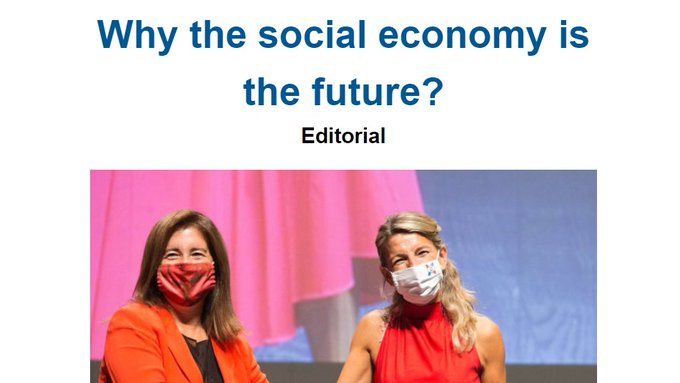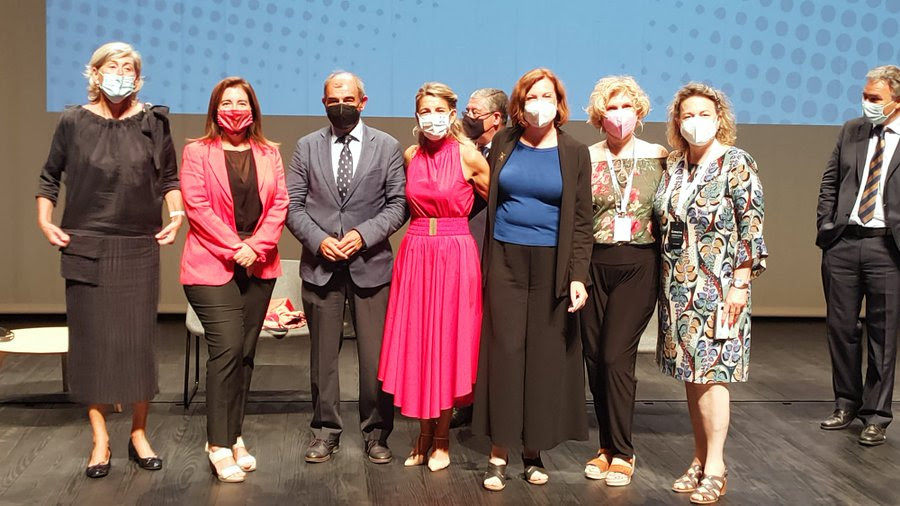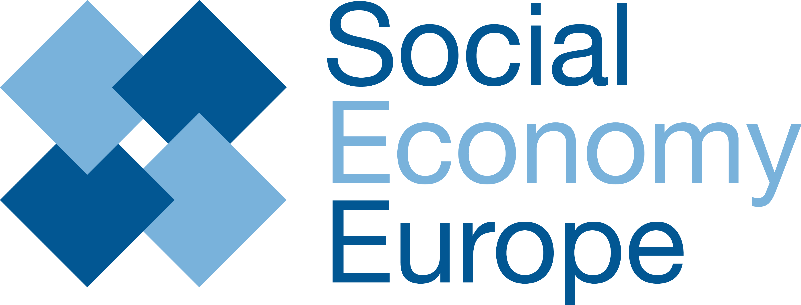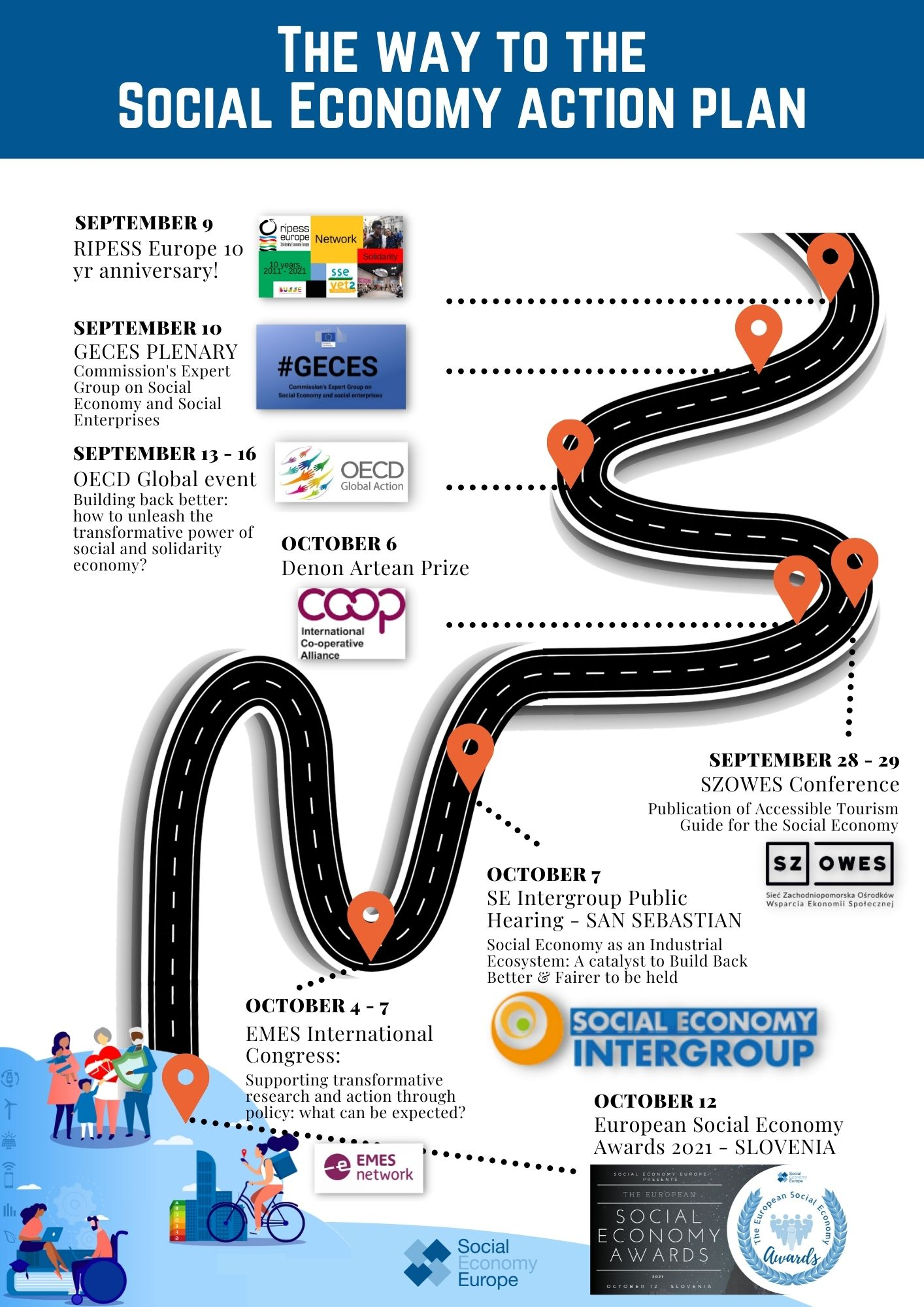
Γιατί η κοινωνική οικονομία είναι το μέλλον;
by Víctor Meseguer, Director of Social Economy Europe
Οι κυβερνήσεις της Πορτογαλίας και της Ισπανίας γιόρτασαν πρόσφατα, στην Coimbra, τη Σύνοδο Κορυφής της Ιβηρικής Κοινωνικής Οικονομίας, με στόχο την ανανέωση και την ενίσχυση της συνεργασίας μεταξύ των δύο χωρών για την υποστήριξη της ανάπτυξης της κοινωνικής οικονομίας. Αυτή η ανανεωμένη συνεργασία για την κοινωνική οικονομία επισημοποιήθηκε μέσω ενός μνημονίου συνεννόησης που υπογράφηκε από την Αντιπρόεδρο της Ισπανικής Κυβέρνησης και Υπουργό Εργασίας και Κοινωνικής Οικονομίας Yolanda Díaz και από την Υπουργό Εργασίας, Κοινωνικής Ασφάλισης και Αλληλεγγύης της Πορτογαλίας Ana Mendes Godinho. Και οι δύο υπουργοί χαρακτήρισαν την κοινωνική οικονομία “καταλύτη για την οικοδόμηση ενός καλύτερου μέλλοντος”.

«Όλα αλλάζουν, ο κόσμος της εργασίας, η ζωή μας, η τεχνολογία, αλλά οι αξίες της κοινωνικής οικονομίας, όπως η αλληλεγγύη, η συνεργασία και η δημοκρατία, θα παραμείνουν και θα γίνουν πιο σχετικές τα επόμενα χρόνια».
Yolanda Díaz, Αντιπρόεδρος της Ισπανικής Κυβέρνησης.
«Αυτή είναι η δεκαετία της αλληλεγγύης, της συνεργασίας, της κινητοποίησης: η δεκαετία της κοινωνικής οικονομίας. Πρέπει να συνεργαστούμε περισσότερο όπως κάνουν σήμερα η Πορτογαλία και η Ισπανία ».
Ana Mendes Godinho , Υπουργός Εργασίας, Κοινωνικής Ασφάλισης και Αλληλεγγύης της Πορτογαλίας.
Ο Πρόεδρος της Social Economy Europe (Κοινωνική Οικονομία Ευρώπης) Juan Antonio Pedreño, συμμετείχε επίσης στην εκδήλωση για να μοιραστεί προτάσεις και προσδοκίες σχετικά με το Ευρωπαϊκό Σχέδιο Δράσης για την Κοινωνική Οικονομία που θα δημοσιoποιήσει η Ευρωπαϊκή Επιτροπή πριν από το τέλος του τρέχοντος έτους. Ο Πρόεδρος Pedreño τόνισε ότι το Σχέδιο Δράσης πρέπει να περιλαμβάνει μια κοινή έννοια της ευρωπαϊκής κοινωνικής οικονομίας που αποτελείται από μια ποικιλία οργανωτικών μορφών – όπως συνεταιρισμοί, μορφές αλληλοβοήθειας, ιδρύματα, κοινωνικές επιχειρήσεις και άλλες νομικές μορφές συγκεκριμένες για κάθε κράτος μέλος – που ενοποιούνται γύρω από κοινές αξίες όπως υπεροχή των ανθρώπων και του κοινωνικού στόχου έναντι του κεφαλαίου, της δημοκρατικής ή συμμετοχικής διακυβέρνησης από τα μέλη (εκτός από τα ιδρύματα που δεν έχουν μέλη αλλά μια πρωταρχική κοινωνική αποστολή) και την επανεπένδυση των περισσότερων κερδών . Ο Pedreño υπογράμμισε, επίσης, τη σημασία της υπέρβασης των δηλώσεων και της διάθεσης πόρων στην κοινωνική οικονομία μέσω εργαλείων της ΕΕ, όπως τα Σχέδια Ανάκαμψης και Ανθεκτικότητας (Next GenerationEU), το InvestEU, το ESF Plus (Ευρωπαϊκό Κοινωνικό Ταμείο), το ΕΤΠΑ και άλλα μέσα που αφορούν την ανάπτυξη ικανοτήτων για scale-up και διεθνοποίηση.
Το Mνημόνιο Κατανόησης που υπογράφηκε από τις δύο ιβηρικές χώρες περιλαμβάνει σημαντικά σημεία, όπως η συνεργασία μεταξύ των Εθνικών Συμβουλίων Κοινωνικής Οικονομίας της Πορτογαλίας και της Ισπανίας (που ενώνει όλους τους φορείς της κοινωνικής οικονομίας και τις εθνικές κυβερνήσεις ), την ανταλλαγή ορθών πρακτικών σχετικά με συμπληρωματικά στατιστικά δεδομένα για την κοινωνική οικονομία (satellite accounts) με στόχο την αναπαραγωγή του πορτογαλικού μοντέλου, συνεργασία για την επίτευξη ενός αποτελεσματικού και επιτυχούς Ευρωπαϊκού Σχεδίου Δράσης για την Κοινωνική Οικονομία και την προώθηση της κοινωνικής οικονομίας στη Λατινική Αμερική μέσω των Ιβηρικών-Αμερικανικών Συνόδων Κορυφής .
Η ταινία του 2015 Burnt βασισμένη στον κόσμο της υψηλής κουζίνας , δείχνει πόσο σημαντικά είναι το αποτέλεσμα μιας συλλογικής προσπάθειας, που χρειάζεται ισχυρή συλλογική συμμετοχή. Η κοινωνική οικονομία είναι το μέλλον επειδή τα επιχειρηματικά της μοντέλα αναγνωρίζουν την αλήθεια της επιτυχίας ως συλλογική άσκηση, ενισχύουν τη δημοκρατία, την ισότητα και την ένταξη, μοιράζοντας και επανεπενδύοντας τα κέρδη και επειδή χρησιμεύουν ως μέσο για τις κοινότητες και τις ομάδες για να ενδυναμώσουν και να βρουν συλλογικές λύσεις στις συλλογικές τους προκλήσεις.
Οι επερχόμενες εβδομάδες και μήνες πριν από την κυκλοφορία του Ευρωπαϊκού Σχεδίου Δράσης για την Κοινωνική Οικονομία θα είναι έντονες. Εν τω μεταξύ, από τη Social Economy Europe συμπίπτουμε πλήρως με τις δηλώσεις του Αντιπροέδρου Yolanda Díaz και της Υπουργού Godinho: η κοινωνική οικονομία είναι το μέλλον!

———————————————————————————————————————————————————————————————————
Why the social economy is the future?
by Víctor Meseguer, Director of SEE.
The Governments of Portugal and Spain celebrated yesterday, in Coimbra, the Iberian Social Economy Summit, aiming at renewing and boosting the cooperation between both countries to support the development of the social economy. This renewed cooperation on social economy was formalised through a Memorandum of Understanding signed by the Vice-President of the Spanish Government and Minister for Labour and Social Economy Yolanda Díaz, and by Minister of Labour, Social Security and Solidarity of Portugal Ana Mendes Godinho. Both leaders pointed out to the social economy as a catalyst to build a better future.
“Everything changes, the world of work, our lives, technology, but the values of the social economy, as solidarity, cooperation and democracy, will remain and become more relevant in the coming years”.
Yolanda Díaz, Vice-President of the Spanish Government.
“This is the decade of solidarity, of cooperation, of mobilisation: the decade of the social economy. We need to work more together as Portugal and Spain are doing today.”
Ana Mendes Godinho, Minister of Labour, Social Security and Solidarity of Portugal.
Social Economy Europe President Juan Antonio Pedreño, also participated in the event to share proposals and expectations regarding the European Action Plan for the Social Economy that the European Commission will release before the end of this year. President Pedreño stressed that the Action Plan should include a common concept of the European social economy formed by a diversity of organisational forms – as cooperatives, mutuals, associations, foundations, social enterprises and other legal forms specific to each Member State – united around common values as the primacy of people and the social objective over capital, the democratic or participative governance by members (except for foundations that do not have members but a primary societal mission), and the reinvestment of most profits. Pedreño also underlined the importance of going beyond declarations and devoting ressources to the social economy through EU instruments as the Recovery and Resilience Plans (Next Generation EU), the InvestEU, the ESF Pus, the ERDF and other instruments devoted to capacity building to scale up and internationalise.
The MoU signed by the two Iberian countries includes important points as the cooperation between the Portuguese and Spanish National Social Economy Councils (uniting all social economy actors and the national governments), exchange of good practices about satellite accounts aiming at replicating the Portuguese model; collaboration to achieve an effective and successful European Action Plan for the Social Economy and promoting the social economy in Latin America through the Iberian-American Summits.
The 2015 film Burnt based in the haute cuisine world, shows how success is the result of a collective effort, that needs a strong collective engagement. The social economy is the future because its business models recognise the truth of success as a collective exercise, because they boost democracy, equality and inclusion, sharing and reinvesting profits; and because they serve as a means for communities and groups to empower and find collective solutions to their collective challenges.
The upcoming weeks and months before the release of the European Action Plan for the Social Economy will be intense. In the meantime, from SEE we fully coincide with the statements of VP Yolanda Díaz and Minister Godinho: the social economy is the future!

- 13-16 September: OECD Global Conference on Social Economy Social and Solidarity Economy from the Margins to the Mainstream. A conference part of the OECD Global Action on Social Economy funded by the European Union. More information, agenda & registrations available here.
- 15 September: Strasbourg’s Social Economy Council– An open dialogue between social economy oranisation in view of the French Presidency Conference on Social Economy, to be held in Strasbourg on 17-18 February 2022.
- 21 September: ENSIE event Supporting inclusive labour markets? #WISEs #BuyResponsible
- 28-29 September: Forum on Social Economy, Inclusion and Accessibility, hybrid event from Kołobrzeg (Poland). Co-organised by SZOWES and SEE. More information coming soon.
- 7 October 2021: Social Economy Intergroup public hearing on Social Economy as an Industrial Ecosystem: A catalyst to Build Back Better & Fairer . A hybrid event from San Sebastian (Basque Country, Spain), organised by the SEIG in cooperation with SEE and the Basque High Council of Cooperatives. Draft agenda available here and registration for online participants open here.
- 4-7 October: 8th EMES International Research Conference
- 12 October: Hybrid Gala of the European Social Economy Awards 2021 (18:45-20:45, Slovenian Digital Centre, Ljubljana). More information coming soon!
- 12-13 October: Slovenian Presidency Social Economy Conference, Ljubljana. More information coming soon!
- 14 October: BWISE project launching event in Brussels.
- 15-26 November : 12th ILO SSE Academy in Lisbon, Portugal. Organised in cooperation with CASES.
- 1-3 December: 33 World Cooperative Congress in Seoul


Αφήστε μια απάντηση